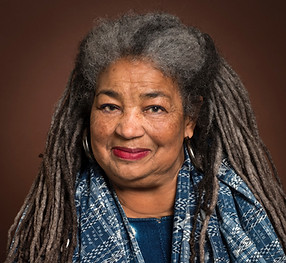

Who We Are
Arianne King Comer
Vice President
Arianne King Comer is an artist, teacher, and indigo advocate based in Charleston, SC. After earning her BFA from Howard University, her passion for indigo blossomed while studying under renowned Batik artist Nike Olyani Davis in Nigeria, a trip made possible by a UN/USIS grant.
Since 1995, Arianne’s work has been featured in numerous solo and joint exhibitions nationwide. As a resident artist in South Carolina, she shares her expertise by teaching community-based textile and multi-medium programs. A board member of the International Center for the Indigo Culture (ICIC), she also serves as an SC representative for the Bloomberg Philanthropy Project’s Economic Empowerment through Crafts.

David Harper
Treasurer
As a land conservation professional married to indigo textile artist Caroline Harper, I combine my career with a love for ecologically-focused design. My work centers on the farm-to-fabric supply chain, where I focus on growing indigo plants and processing them into a natural dye for others to use.
I believe our collaboration as growers, artists, and designers is essential for establishing indigo as a vibrant part of a local living economy. Having planted, harvested, and dyed with this magical plant, I know it has the power to reconnect us to the land and to each other.

Heather Powers (she/they)
President & Acting Secretary
Heather is a professional organizer, artist and appraiser with a rich background in textile design. After earning her BFA in Fiber from SCAD, she spent 15 years as a textile designer on worldwide projects. In 2010, she launched her organizing business, which gives her an intimate understanding of how individuals interact with material culture.
Her artistic practice, informed by her MFA in Critical Craft, investigates memory, place, and identity through weaving and natural dye techniques. She continues to research textile history and utilizes discarded vintage ephemera and materials in her work.

Keisha Cameron
Board Member at Large
Keisha Cameron is a farmer, cultivator, and educator at High Hog Farm, where she works to bridge divides and strengthen community through food and farming. A passionate advocate for social justice, Keisha is dedicated to celebrating and exploring history through storytelling.
She holds a Permaculture Design Certification and has studied agroecology, indigenous land, and foodways, with a focus on food justice and sovereignty. Keisha enjoys sharing her knowledge and passion for agrarian arts, offering workshops and healing circles to promote healing within our food systems. Keisha lives a life generated by love and a desire for understanding to bridge divides and strengthen local and international relationships.
_edited.jpg)
Elizabeth DuBose
Board Member at Large
Elizabeth E. DuBose has served as the Executive Director of the Ossabaw Island Foundation since 1998. With a B.A. in American Studies and an M.A. in Historic Preservation, she has expertly led all aspects of the organization. Her work has included advocating for Ossabaw’s Heritage Preserve designation and overseeing the restoration of ten historic buildings on the island. Ms. DuBose also leads program development and fiscal management, and hosts groups for educational trips, providing expertise on tabby-making, historic preservation, and the island’s rich history, including its native, enslaved, and creative communities.

LaChaun Moore
Board Member at Large
LaChaun Moore is an ethnographic fiber farmer, artist, and designer who founded nnia farm in Charleston, South Carolina. Inspired by her grandfather, a sharecropper, she works with heirloom fiber plants like indigo and naturally colored cotton.
With a BFA in Integrated Design from Parsons, LaChaun’s work explores the intersection of farming, art, and historical equity. She hosts the "Contextualizing Textiles" podcast and is a member of the International Center of Indigo Culture and a board member of the Surface Design Association. Through her art and farm, LaChaun’s ultimate goal is to create a farm-to-fabric brand that prioritizes social and historical equity.

Tony Williams (he/him)
Board Member at Large
Tony Williams is a Cleveland-based artist with an extensive exhibition history in numerous local, national, and international juried shows. His public art projects include "The Year of the Horse" and "The 100 Leaves" sculptures. A past Karamu House resident and a 2019 Cleveland Foundation Creative Fusion Fellow, he is currently an artist-in-residence at the Morgan Conservatory, where he works with indigo on paper. T A 2019 Cleveland Foundation Creative Fusion Fellow: Waterways to Waterways and Contemporary Fibers,
Tony has also curated exhibitions, including "The Ardent Thread" and co-curator for "CONVERGE" LGBTQIA+ art exhibition 2021 Artists Archives of the Western Reserve Cleveland which showcase his deep engagement with contemporary fiber arts and community.


Donna Hardy
Founder & Emeritus Advisor
Donna Hardy is the founder of the International Center for Indigo Culture. Her passion for plants, fiber, and textiles began in childhood and evolved into extensive scholarship on the history of indigo in South Carolina and Georgia.
Rooted in this profound history, Donna is working to create a thriving, sustainable indigo culture in America. Through her organizations, she advocates for the plant's revival, recognizing its deep connection to the land and the people who cultivated it. Her efforts are dedicated to preserving this vital heritage and inspiring a new generation of indigo farmers and artists.